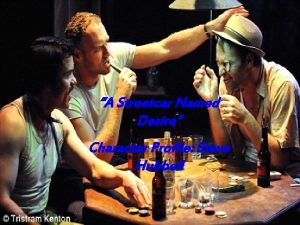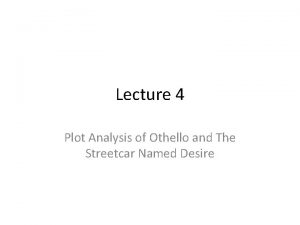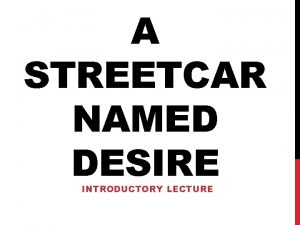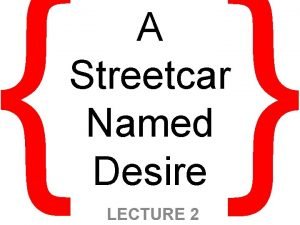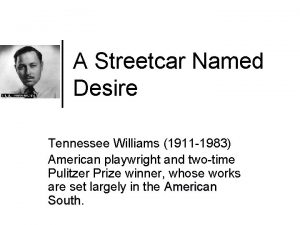A Streetcar Named Desire Tennessee Williams Main Characters


























































- Slides: 58

A Streetcar Named Desire Tennessee Williams

Main Characters • Blanche Du. Bois - Stella's older sister, who was a high school English teacher in Laurel, Mississippi, until she was forced to leave her post. Blanche is a loquacious and fragile woman around the age of thirty. After losing Belle Reve, the Du. Bois family home, Blanche arrives in New Orleans at the Kowalski apartment and eventually reveals that she is completely destitute. Though she has strong sexual urges and has had many lovers, she puts on the airs of a woman who has never known indignity. She avoids reality, preferring to live in her own imagination. As the play progresses, Blanche's instability grows along with her misfortune. Stanley sees through Blanche and finds out the details of her past, destroying her relationship with his friend Mitch. Stanley also destroys what's left of Blanche by raping her and then having her committed to an insane asylum.

• Stanley Kowalski - The husband of Stella. Stanley is the epitome of vital force. He is loyal to his friends, passionate to his wife, and heartlessly cruel to Blanche. With his Polish ancestry, he represents the new, heterogeneous America. He sees himself as a social leveler, and wishes to destroy Blanche's social pretensions. Around thirty years of age, Stanley, who fought in World War II, now works as an autoparts salesman. Practicality is his forte, and he has no patience for Blanche's distortions of the truth. He lacks ideals and imagination. By the play's end, he is a disturbing degenerate: he beats his wife and rapes his sister-in-law. Horrifyingly, he shows no remorse. Yet, Blanche is an outcast from society, while Stanley is the proud family man.

• Harold “Mitch” Mitchell - Stanley's army friend, coworker, and poker buddy, who courts Blanche until he finds out that she lied to him about her sordid past. Mitch, like Stanley, is around thirty years of age. Though he is clumsy, sweaty, and has unrefined interests like muscle building, Mitch is more sensitive and more gentlemanly than Stanley and his other friends, perhaps because he lives with his mother, who is slowly dying. Blanche and Mitch are an unlikely match: Mitch doesn't fit the bill of the chivalric hero, the man Blanche dreams will come to rescue her. Nevertheless, they bond over their lost loves, and when the doctor takes Blanche away against her will, Mitch is the only person present besides Stella who despairs over the tragedy.

Characters • Stella Kowalski - Blanche's younger sister, about twenty-five years old and of a mild disposition that visibly sets her apart from her more vulgar neighbors. Stella possesses the same timeworn aristocratic heritage as Blanche, but she jumped the sinking ship in her late teens and left Mississippi for New Orleans. There, Stella married lower-class Stanley, with whom she shares a robust sexual relationship. • Eunice - Stella's friend, upstairs neighbor, and landlady. Eunice and her husband, Steve, represent the low-class, carnal life that Stella has chosen for herself. Like Stella, Eunice accepts her husband's affections despite his physical abuse of her. • Allan Grey - The young man with poetic aspirations whom Blanche fell in love with and married as a teenager. One afternoon, she discovered Allan in bed with an older male friend. That evening at a ball, after she announced her disgust at his homosexuality, he ran outside and shot himself in the head.

• A Young Collector - A teenager who comes to the Kowalskis' door to collect for the newspaper when Blanche is home alone. The boy leaves bewildered after Blanche hits on him and gives him a passionate farewell kiss. • Shep Huntleigh - A former suitor of Blanche's whom she met again a year before her arrival in New Orleans while vacationing in Miami. Despite the fact that Shep is married, Blanche hopes he will provide the financial support for her and Stella to escape from Stanley. • Steve - Stanley's poker buddy who lives upstairs with his wife, Eunice. Like Stanley, Steve is a brutish, hot-blooded, physically fit male and an abusive husband. • Pablo - Stanley's poker buddy. Like Stanley and Steve, Steve is physically fit and brutish. • A Negro Woman - In Scene One, the Negro woman is sitting on the steps talking to Eunice when Blanche arrives, and she finds Stanley's openly sexual gestures toward Stella hilarious.

• A Doctor - At the play's finale, the doctor arrives to whisk Blanche off to an asylum. He and the nurse initially seem to be heartless institutional caretakers, but, in the end, the doctor appears more kindly as he takes off his jacket and leads Blanche away. • A Mexican Woman - A vendor of Mexican funeral decorations who frightens Blanche by issuing the plaintive call “Flores para los muertos, ” which means “Flowers for the dead. ” • A Nurse - Also called the “Matron, ” she accompanies the doctor to collect Blanche and bring her to an institution. She possesses a severe, unfeminine manner and has a talent for subduing hysterical patients. • Shaw - A supply man who is Stanley's coworker and his source for stories of Blanche's disreputable past in Laurel, Mississippi. Shaw travels regularly through Laurel. • Prostitute - Moments before Stanley rapes Blanche, the back wall of the Kowalskis' apartment becomes transparent, and Blanche sees a prostitute in the street being pursued by a male drunkard.

Summary Blanche Du. Bois, a schoolteacher from Laurel, Mississippi, arrives at the New Orleans apartment of her sister, Stella Kowalski. Despite the fact that Blanche seems to have fallen out of close contact with Stella, she intends to stay at Stella's apartment for an unspecified but likely lengthy period of time, given the large trunk she has with her. Blanche tells Stella that she lost Belle Reve, their ancestral home, following the death of all their remaining relatives. She also mentions that she has been given a leave of absence from her teaching position because of her bad nerves. Though Blanche does not seem to have enough money to afford a hotel, she is disdainful of the cramped quarters of the Kowalskis' two-room apartment and of the apartment's location in a noisy, diverse, working-class neighborhood. Blanche's social condescension wins her the instant dislike of Stella's husband, an auto-parts supply man of Polish descent named Stanley Kowalski. It is clear that Stella was happy to leave behind her the social pretensions of her background in exchange for the sexual gratification she gets from her husband; she even is pregnant with his baby. Stanley immediately distrusts Blanche to the extent that he suspects her of having cheated Stella out of her share of the family inheritance. In the process of defending herself to Stanley, Blanche reveals that Belle Reve was lost due to a foreclosed mortgage, a disclosure that signifies the dire nature of Blanche's financial circumstances. Blanche's heavy drinking, which she attempts to conceal from her sister and brother-in-law, is another sign that all is not well with Blanche.

Summary • The unhappiness that accompanies the animal magnetism of Stella and Stanley's marriage reveals itself when Stanley hosts a drunken poker game with his male friends at the apartment. Blanche gets under Stanley's skin, especially when she starts to win the affections of his close friend Mitch. After Mitch has been absent for a while, speaking with Blanche in the bedroom, Stanley erupts, storms into the bedroom, and throws the radio out of the window. When Stella yells at Stanley and defends Blanche, Stanley beats her. The men pull him off, the poker game breaks up, and Blanche and Stella escape to their upstairs neighbor Eunice's apartment. A short while later, Stanley is remorseful and cries up to Stella to forgive him. To Blanche's alarm, Stella returns to Stanley and embraces him passionately. Mitch meets Blanche outside of the Kowalski flat and comforts her in her distress. The next day, Blanche tries to convince Stella to leave Stanley for a better man whose social status equals Stella's. Blanche suggests that she and Stella contact a millionaire named Shep Huntleigh for help escaping from New Orleans; when Stella laughs at her, Blanche reveals that she is completely broke. Stanley walks in as Blanche is making fun of him and secretly overhears Blanche and Stella's conversation. Later, he threatens Blanche with hints that he has heard rumors of her disreputable past. She is visibly dismayed.

Summary While Blanche is alone in the apartment one evening, waiting for Mitch to pick her up for a date, a teenage boy comes by to collect money for the newspaper. Blanche doesn't have any money for him, but she hits on him and gives him a lustful kiss. Soon after the boy departs, Mitch arrives, and they go on their date. When Blanche returns, she is exhausted and clearly has been uneasy for the entire night about the rumors Stanley mentioned earlier. In a surprisingly sincere heart-to-heart discussion with Mitch, Blanche reveals the greatest tragedy of her past. Years ago, her young husband committed suicide after she discovered and chastised him for his homosexuality. Mitch describes his own loss of a former love, and he tells Blanche that they need each other. When the next scene begins, about one month has passed. It is the afternoon of Blanche's birthday. Stella is preparing a dinner for Blanche, Mitch, Stanley, and herself, when Stanley comes in to tell her that he has learned news of Blanche's sordid past. He says that after losing the Du. Bois mansion, Blanche moved into a fleabag motel from which she was eventually evicted because of her numerous sexual liaisons. Also, she was fired from her job as a schoolteacher because the principal discovered that she was having an affair with a teenage student. Stella is horrified to learn that Stanley has told Mitch these stories about Blanche.

Summary The birthday dinner comes and goes, but Mitch never arrives. Stanley indicates to Blanche that he is aware of her past. For a birthday present, he gives her a one-way bus ticket back to Laurel. Stanley's cruelty so disturbs Stella that it appears the Kowalski household is about to break up, but the onset of Stella's labor prevents the imminent fight. Several hours later, Blanche, drunk, sits alone in the apartment. Mitch, also drunk, arrives and repeats all he's learned from Stanley. Eventually Blanche confesses that the stories are true, but she also reveals the need for human affection she felt after husband's death. Mitch tells Blanche that he can never marry her, saying she isn't fit to live in the same house as his mother. Having learned that Blanche is not the chaste lady she pretended to be, Mitch tries to have sex with Blanche, but she forces him to leave by yelling “Fire!” to attract the attention of passersby outside. Later, Stanley returns from the hospital to find Blanche even more drunk. She tells him that she will soon be leaving New Orleans with her former suitor Shep Huntleigh, who is now a millionaire. Stanley knows that Blanche's story is entirely in her imagination, but he is so happy about his baby that he proposes they each celebrate their good fortune. Blanche spurns Stanley, and things grow contentious. When she tries to step past him, he refuses to move out of her way. Blanche becomes terrified to the point that she smashes a bottle on the table and threatens to smash Stanley in the face. Stanley grabs her arm and says that it's time for the “date” they've had set up since Blanche's arrival. Blanche resists, but Stanley uses his physical strength to overcome her, and he carries her to bed. The pulsing music indicates that Stanley rapes Blanche.

Summary The next scene takes place weeks later, as Stella and her neighbor Eunice pack Blanche's bags. Blanche is in the bath, and Stanley plays poker with his buddies in the front room. A doctor will arrive soon to take Blanche to an insane asylum, but Blanche believes she is leaving to join her millionaire. Stella confesses to Eunice that she simply cannot allow herself to believe Blanche's assertion that Stanley raped her. When Blanche emerges from the bathroom, her deluded talk makes it clear that she has lost her grip on reality. The doctor arrives with a nurse, and Blanche initially panics and struggles against them when they try to take her away. Stanley and his friends fight to subdue Blanche, while Eunice holds Stella back to keep her from interfering. Mitch begins to cry. Finally, the doctor approaches Blanche in a gentle manner and convinces her to leave with him. She allows him to lead her away and does not look back or say goodbye as she goes. Stella sobs with her child in her arms, and Stanley comforts her with loving words and caresses.

Theme Fantasy's Inability to Overcome Reality Although Williams's protagonist in A Streetcar Named Desire is the romantic Blanche Du. Bois, the play is a work of social realism. Blanche explains to Mitch that she fibs because she refuses to accept the hand fate has dealt her. Lying to herself and to others allows her to make life appear as it should be rather than as it is. Stanley, a practical man firmly grounded in the physical world, disdains Blanche's fabrications and does everything he can to unravel them. The antagonistic relationship between Blanche and Stanley is a struggle between appearances and reality. It propels the play's plot and creates an overarching tension. Ultimately, Blanche's attempts to remake her own and Stella's existences—to rejuvenate her life and to save Stella from a life with Stanley—fail. One of the main ways Williams dramatizes fantasy's inability to overcome reality is through an exploration of the boundary between exterior and interior. The set of the play consists of the two-room Kowalski apartment and the surrounding street. Williams's use of a flexible set that allows the street to be seen at the same time as the interior of the home expresses the notion that the home is not a domestic sanctuary. The Kowalskis' apartment cannot be a self-defined world that is impermeable to greater reality. The characters leave and enter the apartment throughout the play, often bringing with them the problems they encounter in the larger environment. For example, Blanche refuses to leave her prejudices against the working class behind her at the door. The most notable instance of this effect occurs just before Stanley rapes Blanche, when the back wall of the apartment becomes transparent to show the struggles occurring on the street, foreshadowing the violation that is about to take place in the Kowalskis' home. Though reality triumphs over fantasy in A Streetcar Named Desire, Williams suggests that fantasy is an important and useful tool. At the end of the play, Blanche's retreat into her own private fantasies enables her to partially shield herself from reality's harsh blows. Blanche's insanity emerges as she retreats fully into herself, leaving the objective world behind in order to avoid accepting reality. In order to escape fully, however, Blanche must come to perceive the exterior world as that which she imagines in her head. Thus, objective reality is not an antidote to Blanche's fantasy world; rather, Blanche adapts the exterior world to fit her delusions. In both the physical and the psychological realms, the boundary between fantasy and reality is permeable. Blanche's final, deluded happiness suggests that, to some extent, fantasy is a vital force at play in every individual's experience, despite reality's inevitable triumph.

Theme The Relationship between Sex and Death Blanche's fear of death manifests itself in her fears of aging and of lost beauty. She refuses to tell anyone her true age or to appear in harsh light that will reveal her faded looks. She seems to believe that by continually asserting her sexuality, especially toward men younger than herself, she will be able to avoid death and return to the world of teenage bliss she experienced before her husband's suicide. However, beginning in Scene One, Williams suggests that Blanche's sexual history is in fact a cause of her downfall. When she first arrives at the Kowalskis', Blanche says she rode a streetcar named Desire, then transferred to a streetcar named Cemeteries, which brought her to a street named Elysian Fields. This journey, the precursor to the play, allegorically represents the trajectory of Blanche's life. The Elysian Fields are the land of the dead in Greek mythology. Blanche's lifelong pursuit of her sexual desires has led to her eviction from Belle Reve, her ostracism from Laurel, and, at the end of the play, her expulsion from society at large. Sex leads to death for others Blanche knows as well. Throughout the play, Blanche is haunted by the deaths of her ancestors, which she attributes to their “epic fornications. ” Her husband's suicide results from her disapproval of his homosexuality. The message is that indulging one's desire in the form of unrestrained promiscuity leads to forced departures and unwanted ends. In Scene Nine, when the Mexican woman appears selling “flowers for the dead, ” Blanche reacts with horror because the woman announces Blanche's fate. Her fall into madness can be read as the ending brought about by her dual flaws—her inability to act appropriately on her desire and her desperate fear of human mortality. Sex and death are intricately and fatally linked in Blanche's experience.

Motif Light Throughout the play, Blanche avoids appearing in direct, bright light, especially in front of her suitor, Mitch. She also refuses to reveal her age, and it is clear that she avoids light in order to prevent him from seeing the reality of her fading beauty. In general, light also symbolizes the reality of Blanche's past. She is haunted by the ghosts of what she has lost—her first love, her purpose in life, her dignity, and the genteel society (real or imagined) of her ancestors. Blanche covers the exposed lightbulb in the Kowalski apartment with a Chinese paper lantern, and she refuses to go on dates with Mitch during the daytime or to well-lit locations. Mitch points out Blanche's avoidance of light in Scene Nine, when he confronts her with the stories Stanley has told him of her past. Mitch then forces Blanche to stand under the direct light. When he tells her that he doesn't mind her age, just her deceitfulness, Blanche responds by saying that she doesn't mean any harm. She believes that magic, rather than reality, represents life as it ought to be. Blanche's inability to tolerate light means that her grasp on reality is also nearing its end. In Scene Six, Blanche tells Mitch that being in love with her husband, Allan Grey, was like having the world revealed in bright, vivid light. Since Allan's suicide, Blanche says, the bright light has been missing. Through all of Blanche's inconsequential sexual affairs with other men, she has experienced only dim light. Bright light, therefore, represents Blanche's youthful sexual innocence, while poor light represents her sexual maturity and disillusionment.

Motif Bathing Throughout A Streetcar Named Desire, Blanche bathes herself. Her sexual experiences have made her a hysterical woman, but these baths, as she says, calm her nerves. In light of her efforts to forget and shed her illicit past in the new community of New Orleans, these baths represent her efforts to cleanse herself of her odious history. Yet, just as she cannot erase the past, her bathing is never done. Stanley also turns to water to undo a misdeed when he showers after beating Stella. The shower serves to soothe his violent temper; afterward, he leaves the bathroom feeling remorseful and calls out longingly for his wife. Drunkenness Both Stanley and Blanche drink excessively at various points during the play. Stanley's drinking is social: he drinks with his friends at the bar, during their poker games, and to celebrate the birth of his child. Blanche's drinking, on the other hand, is anti-social, and she tries to keep it a secret. She drinks on the sly in order to withdraw from harsh reality. A state of drunken stupor enables her to take a flight of imagination, such as concocting a getaway with Shep Huntleigh. For both characters, drinking leads to destructive behavior: Stanley commits domestic violence, and Blanche deludes herself. Yet Stanley is able to rebound from his drunken escapades, whereas alcohol augments Blanche's gradual departure from sanity.

Symbols Shadows and Cries As Blanche and Stanley begin to quarrel in Scene Ten, various oddly shaped shadows begin to appear on the wall behind her. Discordant noises and jungle cries also occur as Blanche begins to descend into madness. All of these effects combine to dramatize Blanche's final breakdown and departure from reality in the face of Stanley's physical threat. When she loses her sanity in her final struggle against Stanley, Blanche retreats entirely into her own world. Whereas she originally colors her perception of reality according to her wishes, at this point in the play she ignores reality altogether. The Varsouviana Polka The Varsouviana is the polka tune to which Blanche and her young husband, Allen Grey, were dancing when she last saw him alive. Earlier that day, she had walked in on him in bed with an older male friend. The three of them then went out dancing together, pretending that nothing had happened. In the middle of the Varsouviana, Blanche turned to Allen and told him that he “disgusted” her. He ran away and shot himself in the head. The polka music plays at various points in A Streetcar Named Desire, when Blanche is feeling remorse for Allen's death. The first time we hear it is in Scene One, when Stanley meets Blanche and asks her about her husband. Its second appearance occurs when Blanche tells Mitch the story of Allen Grey. From this point on, the polka plays increasingly often, and it always drives Blanche to distraction. She tells Mitch that it ends only after she hears the sound of a gunshot in her head. The polka and the moment it evokes represent Blanche's loss of innocence. The suicide of the young husband Blanche loved dearly was the event that triggered her mental decline. Since then, Blanche hears the Varsouviana whenever she panics and loses her grip on reality.

Symbols “It's Only a Paper Moon” In Scene Seven, Blanche sings this popular ballad while she bathes. The song's lyrics describe the way love turns the world into a “phony” fantasy. The speaker in the song says that if both lovers believe in their imagined reality, then it's no longer “make-believe. ” These lyrics sum up Blanche's approach to life. She believes that her fibbing is only her means of enjoying a better way of life and is therefore essentially harmless. As Blanche sits in the tub singing “It's Only a Paper Moon, ” Stanley tells Stella the details of Blanche's sexually corrupt past. Williams ironically juxtaposes Blanche's fantastical understanding of herself with Stanley's description of Blanche's real nature. In reality, Blanche is a sham who feigns propriety and sexual modesty. Once Mitch learns the truth about Blanche, he can no longer believe in Blanche's tricks and lies. Meat In Scene One, Stanley throws a package of meat at his adoring Stella for her to catch. The action sends Eunice and the Negro woman into peals of laughter. Presumably, they've picked up on the sexual innuendo behind Stanley's gesture. In hurling the meat at Stella, Stanley states the sexual proprietorship he holds over her. Stella's delight in catching Stanley's meat signifies her sexual infatuation with him.

Billy Budd Herman Melville

Main Characters • Billy Budd - Discovered on a doorstep as an infant, Billy Budd is a fine physical specimen at age twenty-one, renowned for his good looks and gentle, innocent ways. Upon taking up as a young seaman in the service of His Majesty the King of England, Billy grows into the near-perfect image of what Melville calls the “Handsome Sailor, ” an ideal specimen who inspires love and admiration in all his fellows. While working on board the merchant ship Rights-of. Man, Billy is impressed into naval duty as a foretopman (a sailor who sits atop the foremast or above) on board the warship H. M. S. Bellipotent. Although much younger than most of the Bellipotent's crewmen, the cheerful, innocent young man quickly gains back the popularity he had previously enjoyed, earning the nickname “Baby Budd” in the process. He has several shortcomings, however, including an inability to perceive ill will in other people. He also has an unpredictable tendency to stutter, and at certain crucial moments he is rendered completely speechless.

• John Claggart - The master-at-arms of the Bellipotent, an office equivalent to chief of police on board the ship. Behind his back, the crew refers to Claggart with the derogatory nickname “Jemmy Legs. ” At age thirty-five, Claggart is lean and tall, with a protruding chin and an authoritative gaze. His brow bespeaks cleverness, and his black hair contrasts starkly with his pallid complexion. Because of his pale face, he stays out of the sun as much as possible. The narrator gives few details about Claggart's past, although speculation runs rampant among the crewmembers. It is known that after entering the navy unusually late in life, Claggart rose through the ranks to attain his present position on the strength of his sobriety, deference to authority, and patriotism. However, his compliant exterior disguises a cruel and sinister streak, which the narrator explains is actually a natural tendency toward evil and depravity. Claggart (In-Depth Analysis)

• Captain the Honorable Edward Fairfax Vere - Captain of the H. M. S. Bellipotent. A bachelor of aristocratic lineage, the forty-year-old Vere has made his mark as a distinguished sailor. His nickname, “Starry Vere, ” seems fitting for this abstracted, intellectual figure who often shuts himself up at sea with his books. Vere remains somewhat aloof and diffident among his peers, though he is not haughty.

The Dansker - Billy's acquaintance and confidante aboard the Bellipotent. A wizened old sailor with beady eyes, the Dansker listens and occasionally issues inscrutable, oracular responses when Billy seeks out his confidence. At other times, however, the Dansker is decidedly reticent and unhelpful. Ship's Surgeon - Pronounces Claggart dead upon arriving in the captain's cabin. The surgeon considers Vere's decision to call a drumhead court somewhat abrupt and hasty. Though unable to account for Billy's unusually peaceful death in the gallows, he refuses to believe that the event is attended by supernatural circumstances. Ship's Purser - Ruddy and rotund, the purser speculates that Billy's unusually peaceful death in the gallows shows a phenomenal degree of will on Billy's behalf, perhaps revealing a superhuman power.

Ship's Chaplain - Reluctantly and unsuccessfully attempts to console Billy with words from the Bible on the eve of Billy's execution. Squeak - Claggart's most cunning corporal. Squeak supports and fuels Claggart's contempt for Billy, and tries by various maneuvers to make Billy's life miserable. Albert - Captain Vere's hammock boy. Trusted by the captain, Albert is sent to summon Billy to the cabin on the day Claggart accuses him. Lieutenant Ratcliffe - The brusque boarding officer of the Bellipotent. Lieutenant Ratcliffe selects only Billy from the company of the Rights-of-Man for impressment, or involuntary recruitment into naval service. Captain Graveling - Captain of the Rights-of-Man. At fifty, the slightly overweight Captain Graveling is a benign, conscientious shipmaster who is sorry to lose Billy Budd to the Bellipotent. The Red Whiskers - Billy's adversary aboard the Rights-of-Man. When Billy strikes him, his hatred of Billy turns to love, which both parallels and contrasts with Billy's disastrous striking of Claggart. Red Pepper - The forecastleman who reproves Billy for not taking greater disciplinary action against the stranger who tries to corrupt him.

Summary The setting is the last decade of the eighteenth century. The British naval warship H. M. S. Bellipotent impresses, or involuntarily recruits, the young sailor Billy Budd, extracting him from duty aboard the Rights-of-Man, a merchant ship. Billy's commanding officer, Captain Graveling, though reluctant to let one of his best men go, has little choice in the face of the superior ship's demands. Billy packs up his gear without so much as a protest and follows the boarding officer of the Bellipotent, Lieutenant Ratcliffe, across the gangway to his new assignment. After a cheery good-bye to his old mates, Billy settles in quickly among the company of the Bellipotent. He proves most industrious and eager in his role as foretopman and soon earns the affection of his more experienced fellow sailors. Billy is deeply affected by the sight of a violent lashing given to one of the ship's crew. Hoping to avoid a similar punishment, Billy attempts to fulfill his duties in model fashion, but finds himself under constant scrutiny due to various minor infractions. Puzzled by this persecution, Billy seeks out the advice of the Dansker, an aged, experienced sailor. After explaining the situation to him, the Dansker concludes that Claggart, the master-at-arms, holds a grudge against Billy. Refusing to accept this theory, Billy dismisses the Dansker's opinion but continues to wonder pensively about his situation. Shortly thereafter, at a lunchtime meal, Billy accidentally spills his soup pan in the ship's dining room after a sudden lurch. The contents of the pan trickle to the feet of the passing Claggart, who makes an offhand, seemingly lighthearted remark in recognition of the spill. His comment elicits a stream of obligatory laughter from the ship's company, and Billy interprets the event as proof of Claggart's approval. But Claggart is offended by the accident, and finds it indicative of Billy's contempt for him. He fixates on the accident as proof of Billy's hostility, and his assistant Squeak resolves to increase his surreptitious persecutions of Billy in recompense.

Summary One night, an anonymous figure rouses Billy from his sleep on the upper deck and asks him to meet in a remote quarter of the ship. Confused, Billy mechanically obeys. At the mysterious rendezvous, Billy is puzzled when, after some vague discourse, the unidentified man flashes two guineas in exchange for a promise of cooperation. Without comprehending the exact details of this solicitation, Billy recognizes that something is amiss, and he raises his stuttering voice and threatens the man with uncharacteristic violence. The conspirator quickly slinks into the darkness, and Billy finds himself confronted with the curious inquiries of two fellow sailors. Unsure of how to explain the situation, Billy explains that he simply happened upon a fellow sailor who was in the wrong part of the ship, and chased the man back to his proper station with a gruff rebuke. Somewhat later, after a brief skirmish with an enemy frigate, Claggart approaches Captain Vere with news of a rumored mutiny and names Billy Budd as the ringleader of the rebellion. Vere summons Billy to his cabin and instructs Claggart to repeat his accusation. Upon hearing of this unexpected blot on his character, Billy is rendered speechless. Vere commands Billy to defend himself, but then, noticing Billy's tendency to stutter, softens his approach. Left with no other means of defense, and twisted into a rage at Claggart's outrageous words against him, Billy strikes out in a fury, giving Claggart a swift punch to the forehead.

Summary The blow proves forceful enough to knock Claggart unconscious, and he lies bleeding from the nose and ears as Billy and Vere attempt to revive him. Abandoning this effort, Vere dismisses Billy to a neighboring stateroom until further notice. The ship's surgeon pronounces Claggart dead after a brief examination, and Captain Vere summons a group of his senior officers to the cabin. In a decisive move, Vere calls a drumhead court consisting of the captain of the marines, the first lieutenant, and the sailing master. Vere, functioning as the main witness, gives a testimony of the relevant events to the jury. Billy remains rather silent during his period of questioning, admitting to the blow but maintaining his innocence of intention and declaring his lack of affiliation with any potential mutiny. The court dismisses Billy again to the stateroom. During a tense period of deliberation, Vere hovers over the jury. When they seem to be deadlocked, unable to make a decision, Vere steps forward to declare his conviction that the rule of law must supersede the reservations of conscience. He concludes his speech to the jury by insisting that they decide to acquit or condemn in strict accordance with the letter of military law. After a period of further deliberation, the jury finds Billy Budd guilty as charged and sentences him to death by hanging on the following morning.

Summary Captain Vere communicates to Billy the news of his fate and, after a discussion with him that we do not learn about directly, he withdraws to leave the prisoner by himself. Later that evening, Vere calls a general meeting of the ship's crew and explains the events of the day. Claggart receives an official burial at sea, and all hands prepare to bear witness to Billy's hanging at dawn. Billy spends his final hours in chains on board an upper gun deck, guarded by a sentry. The ship's chaplain attempts to spiritually prepare Billy for his death, but Billy already seems to be in a state of perfect peace and resignation. As the chaplain withdraws from Billy's company, he kisses him gently on the cheek as a token of good will. That morning, shortly after four A. M. , Billy is hanged in the mainyard of the ship. As the crew watches him being strung up, preparing to die, they hear him utter his last words: “God bless Captain Vere!” The assembled company automatically echoes this unexpected sentiment, and Billy expires with surprising calm as dawn breaks over the horizon. After Billy's death, the crew begins to murmur, but the officers quickly disperse them to various tasks. Whistles blow and the ship returns to regular business. In the ensuing days, sailors engage in various discussions concerning Billy's fate and the mysterious circumstances of his expiration. On its return voyage, the Bellipotent falls in with a French warship, the Athée, or Atheist. Captain Vere, wounded in the skirmish, eventually dies in a Gibraltar hospital, uttering as his last words, “Billy Budd, Billy Budd. ” Finally, the legend of Billy Budd becomes recorded and institutionalized in naval circles. A newspaper reports the incident from afar, implicating Billy Budd as the villainous assailant of an innocent Claggart. The sailors themselves, however, begin to revere Billy's growing legend, treating the spar from his gallows as a holy object, and composing laudatory verse in his memory.

Theme The Individual Versus Society Melville is deeply interested in the ways in which society forces people to curtail or limit their individuality. When the warship Bellipotent extracts the unassuming Billy from his former ship, the Rights-of-Man, the symbolism is relatively explicit: society is all-powerful, it compels men into participation in war, and in doing so it can readily dispense with the rights of the individual. The names of the ships alone— Bellipotent means “power of war”—suggest as much. Captain Vere's dilemma in dealing with Billy illustrates how society requires the separation of one's inner feelings from one's social obligations. In prosecuting Billy, Vere decides to follow the letter of the law, despite his own sense that Billy personifies goodness and innocence. Feeling the pressure of his position as a leader with a responsibility to see that the men obey the Mutiny Act, Vere forces himself to disregard his own feelings about Billy's situation and even urges the jurors in the case to do the same. Laws, not the dictates of individual conscience, govern society; in order to fill a social role well, it may sometimes be necessary to act against one's own impulses. To be a “good” captain, Vere must do something that he instinctually interprets as morally wrong—condemning an innocent soul. Being a good captain requires him to be a bad friend to Billy, just as being a good friend to Billy would require him to be a bad captain. In presenting Vere's dilemma, the narrator introduces a lengthy discussion about the famous mutiny at Nore. The narrator shows that most of the participants in the mutiny ultimately redeem themselves in the momentous victory at Trafalgar, where they display true patriotism. The narrator's point seems to be that the impulses of individuals are generally good and beneficial to society as a whole. However, the outcome of the narrator's story is more ominous. Although the British war machine greatly benefits from the individual enthusiasm and patriotism of its sailors, the more powerful the navy becomes, the more it is able to squelch individualism. In fact, the harsh legislation of the Mutiny Act is passed to suppress any further murmurings of dissent. Melville seems to suggest that ultimately, the individual's attempt to assert himself in the face of society will prove futile.

Theme Conscience Versus Law Although a number of the characters in Billy Budd possess strong individual consciences; fundamentally, the people on the ship are unable to trust one another. Paranoia abounds. Consequently, life aboard the ship is governed by a strict set of rules, and everybody trusts the rules—not the honor or conscience of individuals—to maintain order. The mistrust that the characters feel, and that is likely also to affect us as we read, stems from the sense that evil is pervasive. Evil men like Claggart seem to be lurking everywhere. Because it is impossible to know for sure whether people's intentions are good or evil, the evil men not only disguise their own insidious designs, they also impute evil motives to others. Most notably, Claggart misinterprets Billy's intention in the soup-spilling incident and subsequently plots his downfall. The Dansker understands this sort of dishonesty all too well, and as a result, he has acquired a cynicism in his dealings with other people. The Dansker's reticence may be interpreted in different ways, but one plausible interpretation is that he fails to take direct action against evil men because he fears the consequences of confronting evil directly, thus leaving other good men like Billy to fend for themselves. He may represent people who play roles in order to fit into society, never fully acting on their own impulses and distancing themselves from the rest of society. In this reading, the Dansker confronts a dilemma similar to Vere's. The Dansker likes Billy and tries to help him, but he ultimately sacrifices Billy to the claustrophobic, paranoid world of the ship, in which men are disconnected from their own consciences. In Billy Budd, men who confront the law and men who confront evil suffer similar consequences, suggesting the dark view that evil and the law are closely connected.

Theme The Vulnerability of Innocence Billy Budd does not represent goodness so much as he does innocence, and the conflict between innocence and evil in this novel is different from the conflict between good and evil. The narrator makes clear that Billy is not a hero in the traditional sense. Though he has the good looks and blithe attitude of the ideal Handsome Sailor, his defining characteristic is extreme naïveté, not moral strength or courage. Billy does not have a sufficient awareness of good and evil to choose goodness consciously, let alone champion it. Because he is unable to recognize evil when confronted by it, he ultimately allows Claggart to draw him away from virtue and into violence. As a youthful, handsome, and popular sailor, Billy wishes only to be well liked and well-adjusted in his social role. He assumes that no one has cause to dislike him, and takes everyone at face value. Claggart, on the other hand, is full of deception, distrust, and malice, and interprets Billy's placidity as a dangerous façade. Claggart seems to destroy Billy for no reason other than the latter's innocence. Evil exists to corrupt innocence, and even though Billy kills Claggart, in a sense Claggart achieves a double victory over Billy in his own death. Claggart's actions cause Billy to fall from both social and moral grace by committing murder, and Billy suffers death as a consequence.

Motif Christian Allegory Although the narrator rarely alludes to the Bible explicitly, Billy Budd contains many implicit allusions to the imagery, language, and stories of the Bible, creating a sustained parallel between Billy's story and Christ's Passion, the story of Christ's suffering and death on the cross. Like Christ, Billy sacrifices his life as the innocent victim of a hostile society. Vere's role in the story parallels that of Pontius Pilate in the Gospels, as he is the official who permits the sacrifice by following the letter of the law instead of his own conscience. Claggart functions as a satanic figure, tempting Billy into evil and working to destroy him throughout the novel. Satan is not a part of the story of Christ's Passion, and Claggart's temptation of Billy more closely mirrors the serpent's temptation of Adam and Eve in the Garden of Eden than anything in the Gospels. The narrator makes Claggart's connection to the serpent in Genesis more explicit by comparing Claggart's dead body to the corpse of a snake. In addition to these main parallels, the novel's innumerable Christian references form a complex web of associations and contrasts. Critics remain sharply divided over whether Billy Budd's religious imagery represents Melville's embrace of religion or harsh critique of it, which illustrates the ambiguity of the religious allegory in the story. Melville leaves to each reader the decision of what the connection between Billy Budd and Christianity signifies.

Motif Suggestive Names Throughout the novel, Melville uses names to indicate ideas about the true nature of people and things. For example, Billy's last name, Budd, suggests his innocence and youth by conjuring an image of a flower's bud. Captain Vere's name suggests his tendency to veer between attitudes. The name of the Rights-of. Man suggests the greater individual liberties enjoyed by the crew of that happier ship, while the name of the Bellipotent suggests its association with war and the power represented by its military order. The name of the Athée means “the atheist, ” and when this ship defeats the Bellipotent—which carries the characters who stand for Christian figures—the event suggests that Christian society moves toward a disastrous fall from grace as it becomes more dependent on violence and military discipline.

Motif Primitive and Animal Imagery The narrator frequently uses animal imagery to describe both Billy and his fellow sailors. For example, the narrator remarks that Billy appears to have the “self-consciousness” of a Saint Bernard. Later, the narrator says that Billy “was like a young horse fresh from the pasture suddenly inhaling a vile whiff from some chemical factory” when presented with the conspiratorial bribe. Again, during the trial, Billy gives Vere a questioning look “not unlike that which a dog of generous breed might turn upon his master. ” When he lashes out at Claggart, Billy is said to resemble a cornered dog or caged monkey. This animal imagery functions primarily to highlight Billy's extreme innocence, suggesting moreover that he is distanced from society because he lacks the proper vocabulary to understand social interactions. Melville combines this animal imagery with references to Billy as a “babe, ” a “savage, ” and an “upright barbarian, ” suggesting that Billy represents Melville's exploration of what happens to the natural or primitive man when confronted with the law and Christianity.

Motif Mutiny figures prominently in the plot and historical background of Billy Budd, and it relates to numerous themes as well. The feigned mutinous conspiracy presented to Billy by the anonymous stranger on the upper deck ultimately leads to his demise. The narrator spends much time detailing the mutinies that ultimately led to the Mutiny Act, the law that necessitates Vere's condemnation of Billy. On the one hand, mutiny represents opposition to war. It also represents individuality and agency in the face of authority. Still, since a successful mutiny requires the cooperation of many sailors, it also represents a form of society. Moreover, this association defines itself in opposition to an authoritarian force that aims to keep men separated from their fellow dissenters. Thus, the captains whistle the men back to their individual duties quickly whenever they hear a murmur in the crowd.

Symbols The Ships Broadly speaking, the H. M. S. Bellipotent symbolizes society, with the actions of a few characters standing for the state of human society in general. In a sense, the various ships in the novel represent different types of societies: the Rights-of-Man symbolizes a place where individuals maintain their individuality, while the Bellipotent represents a military world in which, under the threat of violence—and therefore in the presence of evil—the rules of society impinge upon the individual rights of men. The Athée, whose name means “the atheist” in French, symbolizes the anti-religious aspects of a powerful, war-driven society. The Purser and the Surgeon The purser and the surgeon who debate Billy's story after his death represent faith and skepticism, the two fundamentally opposed attitudes toward religious mysteries. The purser believes that Billy's death indicates some special quality in Billy, possibly supernatural. The surgeon, on the other hand, maintaining a scientific viewpoint, refuses to acknowledge Billy's unusually peaceful death as more than a quirk of matter. Besides dramatizing two long-standing attitudes toward religion, these two characters and their conversation are important because they initiate the narrator's exploration of Billy's posthumous legend. The narrator ultimately calls into question the novel's larger Christian allegory as he investigates how people transform events into legendary narratives.

Frankenstein Mary Shelly

Main Characters • Victor Frankenstein's life story is at the heart of Frankenstein. A young Swiss boy, he grows up in Geneva reading the works of the ancient and outdated alchemists, a background that serves him ill when he attends university at Ingolstadt. There he learns about modern science and, within a few years, masters all that his professors have to teach him. He becomes fascinated with the “secret of life, ” discovers it, and brings a hideous monster to life. The monster proceeds to kill Victor's youngest brother, best friend, and wife; he also indirectly causes the deaths of two other innocents, including Victor's father. Though torn by remorse, shame, and guilt, Victor refuses to admit to anyone the horror of what he has created, even as he sees the ramifications of his creative act spiraling out of control.

The Monster The monster is Victor Frankenstein's creation, assembled from old body parts and strange chemicals, animated by a mysterious spark. He enters life eight feet tall and enormously strong but with the mind of a newborn. Abandoned by his creator and confused, he tries to integrate himself into society, only to be shunned universally. Looking in the mirror, he realizes his physical grotesqueness, an aspect of his persona that blinds society to his initially gentle, kind nature. Seeking revenge on his creator, he kills Victor's younger brother. After Victor destroys his work on the female monster meant to ease the monster's solitude, the monster murders Victor's best friend and then his new wife.

Robert Walton's letters to his sister form a frame around the main narrative, Victor Frankenstein's tragic story. Walton captains a North Pole–bound ship that gets trapped between sheets of ice. While waiting for the ice to thaw, he and his crew pick up Victor, weak and emaciated from his long chase after the monster. Victor recovers somewhat, tells Walton the story of his life, and then dies. Walton laments the death of a man with whom he felt a strong, meaningful friendship beginning to form.

Characters Alphonse Frankenstein - Victor's father, very sympathetic toward his son. Alphonse consoles Victor in moments of pain and encourages him to remember the importance of family. Elizabeth Lavenza - An orphan, four to five years younger than Victor, whom the Frankensteins adopt. In the 1818 edition of the novel, Elizabeth is Victor's cousin, the child of Alphonse Frankenstein's sister. In the 1831 edition, Victor's mother rescues Elizabeth from a destitute peasant cottage in Italy. Elizabeth embodies the novel's motif of passive women, as she waits patiently for Victor's attention. Henry Clerval - Victor's boyhood friend, who nurses Victor back to health in Ingolstadt. After working unhappily for his father, Henry begins to follow in Victor's footsteps as a scientist. His cheerfulness counters Victor's moroseness.

William Frankenstein - Victor's youngest brother and the darling of the Frankenstein family. The monster strangles William in the woods outside Geneva in order to hurt Victor for abandoning him. William's death deeply saddens Victor and burdens him with tremendous guilt about having created the monster. Justine Moritz - A young girl adopted into the Frankenstein household while Victor is growing up. Justine is blamed and executed for William's murder, which is actually committed by the monster. Caroline Beaufort - The daughter of Beaufort. After her father's death, Caroline is taken in by, and later marries, Alphonse Frankenstein. She dies of scarlet fever, which she contracts from Elizabeth, just before Victor leaves for Ingolstadt at age seventeen.

Beaufort - A merchant and friend of Victor's father; the father of -Caroline Beaufort. Peasants - A family of peasants, including a blind old man, De Lacey; his son and daughter, Felix and Agatha; and a foreign woman named Safie. The monster learns how to speak and interact by observing them. When he reveals himself to them, hoping for friendship, they beat him and chase him away. M. Waldman - The professor of chemistry who sparks Victor's interest in science. He dismisses the alchemists' conclusions as unfounded but sympathizes with Victor's interest in a science that can explain the “big questions, ” such as the origin of life. M. Krempe - A professor of natural philosophy at Ingolstadt. He dismisses Victor's study of the alchemists as wasted time and encourages him to begin his studies anew. Mr. Kirwin - The magistrate who accuses Victor of Henry's murder.

Summary • Frankenstein opens with a preface, signed by Mary Shelley but commonly supposed to have been written by her husband, Percy Bysshe Shelley. It states that the novel was begun during a summer vacation in the Swiss Alps, when unseasonably rainy weather and nights spent reading German ghost stories inspired the author and her literary companions to engage in a ghost story writing contest, of which this work is the only completed product. • The novel itself begins with a series of letters from the explorer Robert Walton to his sister, Margaret Saville. Walton, a well-to-do Englishman with a passion for seafaring, is the captain of a ship headed on a dangerous voyage to the North Pole. In the first letter, he tells his sister of the preparations leading up to his departure and of the desire burning in him to accomplish “some great purpose”—discovering a northern passage to the Pacific, revealing the source of the Earth's magnetism, or simply setting foot on undiscovered territory.

Summary • • In the second letter, Walton bemoans his lack of friends. He feels lonely and isolated, too sophisticated to find comfort in his shipmates and too uneducated to find a sensitive soul with whom to share his dreams. He shows himself a Romantic, with his “love for the marvellous, a belief in the marvellous, ” which pushes him along the perilous, lonely pathway he has chosen. In the brief third letter, Walton tells his sister that his ship has set sail and that he has full confidence that he will achieve his aim. In the fourth letter, the ship stalls between huge sheets of ice, and Walton and his men spot a sledge guided by a gigantic creature about half a mile away. The next morning, they encounter another sledge stranded on an ice floe. All but one of the dogs drawing the sledge is dead, and the man on the sledge—not the man seen the night before—is emaciated, weak, and starving. Despite his condition, the man refuses to board the ship until Walton tells him that it is heading north. The stranger spends two days recovering, nursed by the crew, before he can speak. The crew is burning with curiosity, but Walton, aware of the man's still-fragile state, prevents his men from burdening the stranger with questions. As time passes, Walton and the stranger become friends, and the stranger eventually consents to tell Walton his story. At the end of the fourth letter, Walton states that the visitor will commence his narrative the next day; Walton's framing narrative ends and the stranger's begins.

The stranger, who the reader soon learns is Victor Frankenstein, begins his narration. He starts with his family background, birth, and early childhood, telling Walton about his father, Alphonse, and his mother, Caroline. Alphonse became Caroline's protector when her father, Alphonse's longtime friend Beaufort, died in poverty. They married two years later, and Victor was born soon after. Frankenstein then describes how his childhood companion, Elizabeth Lavenza, entered his family. At this point in the narrative, the original (1818) and revised (1831) versions of Frankenstein diverge. In the original version, Elizabeth is Victor's cousin, the daughter of Alphonse's sister; when Victor is four years old, Elizabeth's mother dies and Elizabeth is adopted into the Frankenstein family. In the revised version, Elizabeth is discovered by Caroline, on a trip to Italy, when Victor is about five years old. While visiting a poor Italian family, Caroline notices a beautiful blonde girl among the dark-haired Italian children; upon discovering that Elizabeth is the orphaned daughter of a Milanese nobleman and a German woman and that the Italian family can barely afford to feed her, Caroline adopts Elizabeth and brings her back to Geneva. Victor's mother decides at the moment of the adoption that Elizabeth and Victor should someday marry. Elizabeth and Victor grow up together as best friends. Victor's friendship with Henry Clerval, a schoolmate and only child, flourishes as well, and he spends his childhood happily surrounded by this close domestic circle. As a teenager, Victor becomes increasingly fascinated by the mysteries of the natural world. He chances upon a book by Cornelius Agrippa, a sixteenth-century scholar of the occult sciences, and becomes interested in natural philosophy. He studies the outdated findings of the alchemists Agrippa, Paracelsus, and Albertus Magnus with enthusiasm. He witnesses the destructive power of nature when, during a raging storm, lightning destroys a tree near his house. A modern natural philosopher accompanying the Frankenstein family explains to Victor the workings of electricity, making the ideas of the alchemists seem outdated and worthless. (In the 1818 version, a demonstration of electricity by his father convinces Victor of the alchemists' mistakenness. )

At the age of seventeen, Victor leaves his family in Geneva to attend the university at Ingolstadt. Just before Victor departs, his mother catches scarlet fever from Elizabeth, whom she has been nursing back to health, and dies. On her deathbed, she begs Elizabeth and Victor to marry. Several weeks later, still grieving, Victor goes off to Ingolstadt. Arriving at the university, he finds quarters in the town and sets up a meeting with a professor of natural philosophy, M. Krempe tells Victor that all the time that Victor has spent studying the alchemists has been wasted, further souring Victor on the study of natural philosophy. He then attends a lecture in chemistry by a professor named Waldman. This lecture, along with a subsequent meeting with the professor, convinces Victor to Victor attacks his studies with enthusiasm and, ignoring his social life and his family far away in Geneva, makes rapid progress. Fascinated by the mystery of the creation of life, he begins to study how the human body is built (anatomy) and how it falls apart (death and decay). After several years of tireless work, he masters all that his professors have to teach him, and he goes one step further: discovering the secret of life. Privately, hidden away in his apartment where no one can see him work, he decides to begin the construction of an animate creature, envisioning the creation of a new race of wonderful beings. Zealously devoting himself to this labor, he neglects everything else —family, friends, studies, and social life—and grows increasingly pale, lonely, and obsessed.

One stormy night, after months of labor, Victor completes his creation. But when he brings it to life, its awful appearance horrifies him. He rushes to the next room and tries to sleep, but he is troubled by nightmares about Elizabeth and his mother's corpse. He wakes to discover the monster looming over his bed with a grotesque smile and rushes out of the house. He spends the night pacing in his courtyard. The next morning, he goes walking in the town of Ingolstadt, frantically avoiding a return to his now-haunted apartment. As he walks by the town inn, Victor comes across his friend Henry Clerval, who has just arrived to begin studying at the university. Delighted to see Henry—a breath of fresh air and a reminder of his family after so many months of isolation and ill health—he brings him back to his apartment. Victor enters first and is relieved to find no sign of the monster. But, weakened by months of work and shock at the horrific being he has created, he immediately falls ill with a nervous fever that lasts several months. Henry nurses him back to health and, when Victor has recovered, gives him a letter from Elizabeth that had arrived during his illness. Elizabeth's letter expresses her concern about Victor's illness and entreats him to write to his family in Geneva as soon as he can. She also tells him that Justine Moritz, a girl who used to live with the Frankenstein family, has returned to their house following her mother's death. After Victor has recovered, he introduces Henry, who is studying Oriental languages, to the professors at the university. The task is painful, however, since the sight of any chemical instrument worsens Victor's symptoms; even speaking to his professors torments him. He decides to return to Geneva and awaits a letter from his father specifying the date of his departure. Meanwhile, he and Henry take a walking tour through the country, uplifting their spirits with the beauties of nature.

On their return to the university, Victor finds a letter from his father telling him that Victor's youngest brother, William, has been murdered. Saddened, shocked, and apprehensive, Victor departs immediately for Geneva. By the time he arrives, night has fallen and the gates of Geneva have been shut, so he spends the evening walking in the woods around the outskirts of the town. As he walks near the spot where his brother's body was found, he spies the monster lurking and becomes convinced that his creation is responsible for killing William. The next day, however, when he returns home, Victor learns that Justine has been accused of the murder. After the discovery of the body, a servant had found in Justine's pocket a picture of Caroline Frankenstein last seen in William's possession. Victor proclaims Justine's innocence, but the evidence against her seems irrefutable, and Victor refuses to explain himself for fear that he will be labeled insane. Justine confesses to the crime, believing that she will thereby gain salvation, but tells Elizabeth and Victor that she is innocent—and miserable. They remain convinced of her innocence, but Justine is soon executed. Victor becomes consumed with guilt, knowing that the monster he created and the cloak of secrecy within which the creation took place have now caused the deaths of two members of his family.

After Justine's execution, Victor becomes increasingly melancholy. He considers suicide but restrains himself by thinking of Elizabeth and his father. Alphonse, hoping to cheer up his son, takes his children on an excursion to the family home at Belrive. From there, Victor wanders alone toward the valley of Chamounix. The beautiful scenery cheers him somewhat, but his respite from grief is short-lived. One rainy day, Victor wakes to find his old feelings of despair resurfacing. He decides to travel to the summit of Montanvert, hoping that the view of a pure, eternal, beautiful natural scene will revive his spirits. When he reaches the glacier at the top, he is momentarily consoled by the sublime spectacle. As he crosses to the opposite side of the glacier, however, he spots a creature loping toward him at incredible speed. At closer range, he recognizes clearly the grotesque shape of the monster. He issues futile threats of attack to the monster, whose enormous strength and speed allow him to elude Victor easily. Victor curses him and tells him to go away, but the monster, speaking eloquently, persuades him to accompany him to a fire in a cave of ice. Inside the cave, the monster begins to narrate the events of his life.

Sitting by the fire in his hut, the monster tells Victor of the confusion that he experienced upon being created. He describes his flight from Victor's apartment into the wilderness and his gradual acclimation to the world through his discovery of the sensations of light, dark, hunger, thirst, and cold. According to his story, one day he finds a fire and is pleased at the warmth it creates, but he becomes dismayed when he burns himself on the hot embers. He realizes that he can keep the fire alive by adding wood, and that the fire is good not only for heat and warmth but also for making food more palatable. In search of food, the monster finds a hut and enters it. His presence causes an old man inside to shriek and run away in fear. The monster proceeds to a village, where more people flee at the sight of him. As a result of these incidents, he resolves to stay away from humans. One night he takes refuge in a small hovel adjacent to a cottage. In the morning, he discovers that he can see into the cottage through a crack in the wall and observes that the occupants are a young man, a young woman, and an old man. Observing his neighbors for an extended period of time, the monster notices that they often seem unhappy, though he is unsure why. He eventually realizes, however, that their despair results from their poverty, to which he has been contributing by surreptitiously stealing their food. Torn by his guilty conscience, he stops stealing their food and does what he can to reduce their hardship, gathering wood at night to leave at the door for their use. The monster becomes aware that his neighbors are able to communicate with each other using strange sounds. Vowing to learn their language, he tries to match the sounds they make with the actions they perform. He acquires a basic knowledge of the language, including the names of the young man and woman, Felix and Agatha. He admires their graceful forms and is shocked by his ugliness when he catches sight of his reflection in a pool of water. He spends the whole winter in the hovel, unobserved and well protected from the elements, and grows increasingly affectionate toward his unwitting hosts.

As winter thaws into spring, the monster notices that the cottagers, particularly Felix, seem unhappy. A beautiful woman in a dark dress and veil arrives at the cottage on horseback and asks to see Felix becomes ecstatic the moment he sees her. The woman, who does not speak the language of the cottagers, is named Safie. She moves into the cottage, and the mood of the household immediately brightens. As Safie learns the language of the cottagers, so does the monster. He also learns to read, and, since Felix uses Constantin-François de Volney's Ruins of Empires to instruct Safie, he learns a bit of world history in the process. Now able to speak and understand the language perfectly, the monster learns about human society by listening to the cottagers' conversations. Reflecting on his own situation, he realizes that he is deformed and alone. “Was I then a monster, ” he asks, “a blot upon the earth, from which all men fled, and whom all men disowned? ” He also learns about the pleasures and obligations of the family and of human relations in general, which deepens the agony of his own isolation. After some time, the monster's constant eavesdropping allows him to reconstruct the history of the cottagers. The old man, De Lacey, was once an affluent and successful citizen in Paris; his children, Agatha and Felix, were well -respected members of the community. Safie's father, a Turk, was falsely accused of a crime and sentenced to death. Felix visited the Turk in prison and met his daughter, with whom he immediately fell in love. Safie sent Felix letters thanking him for his intention to help her father and recounting the circumstances of her plight (the monster tells Victor that he copied some of these letters and offers them as proof that his tale is true). The letters relate that Safie's mother was a Christian Arab who had been enslaved by the Turks before marrying her father. She inculcated in Safie an independence and intelligence that Islam prevented Turkish women from cultivating. Safie was eager to marry a European man and thereby escape the near-slavery that awaited her in Turkey. Felix successfully coordinated her father's escape from prison, but when the plot was discovered, Felix, Agatha, and De Lacey were exiled from France and stripped of their wealth. They then moved into the cottage in Germany upon which the monster has stumbled. Meanwhile, the Turk tried to force Safie to return to Constantinople with him, but she managed to escape with some money and the knowledge of Felix's whereabouts.

As winter thaws into spring, the monster notices that the cottagers, particularly Felix, seem unhappy. A beautiful woman in a dark dress and veil arrives at the cottage on horseback and asks to see Felix becomes ecstatic the moment he sees her. The woman, who does not speak the language of the cottagers, is named Safie. She moves into the cottage, and the mood of the household immediately brightens. As Safie learns the language of the cottagers, so does the monster. He also learns to read, and, since Felix uses Constantin-François de Volney's Ruins of Empires to instruct Safie, he learns a bit of world history in the process. Now able to speak and understand the language perfectly, the monster learns about human society by listening to the cottagers' conversations. Reflecting on his own situation, he realizes that he is deformed and alone. “Was I then a monster, ” he asks, “a blot upon the earth, from which all men fled, and whom all men disowned? ” He also learns about the pleasures and obligations of the family and of human relations in general, which deepens the agony of his own isolation. After some time, the monster's constant eavesdropping allows him to reconstruct the history of the cottagers. The old man, De Lacey, was once an affluent and successful citizen in Paris; his children, Agatha and Felix, were well -respected members of the community. Safie's father, a Turk, was falsely accused of a crime and sentenced to death. Felix visited the Turk in prison and met his daughter, with whom he immediately fell in love. Safie sent Felix letters thanking him for his intention to help her father and recounting the circumstances of her plight (the monster tells Victor that he copied some of these letters and offers them as proof that his tale is true). The letters relate that Safie's mother was a Christian Arab who had been enslaved by the Turks before marrying her father. She inculcated in Safie an independence and intelligence that Islam prevented Turkish women from cultivating. Safie was eager to marry a European man and thereby escape the near-slavery that awaited her in Turkey. Felix successfully coordinated her father's escape from prison, but when the plot was discovered, Felix, Agatha, and De Lacey were exiled from France and stripped of their wealth. They then moved into the cottage in Germany upon which the monster has stumbled. Meanwhile, the Turk tried to force Safie to return to Constantinople with him, but she managed to escape with some money and the knowledge of Felix's whereabouts.

While foraging for food in the woods around the cottage one night, the monster finds an abandoned leather satchel containing some clothes and books. Eager to learn more about the world than he can discover through the chink in the cottage wall, he brings the books back to his hovel and begins to read. The books include Johann Wolfgang von Goethe's Sorrows of Werter, a volume of Plutarch's Lives, and John Milton's Paradise Lost, the last of which has the most profound effect on the monster. Unaware that Paradise Lost is a work of imagination, he reads it as a factual history and finds much similarity between the story and his own situation. Rifling through the pockets of his own clothes, stolen long ago from Victor's apartment, he finds some papers from Victor's journal. With his newfound ability to read, he soon understands the horrific manner of his own creation and the disgust with which his creator regarded him. Dismayed by these discoveries, the monster wishes to reveal himself to the cottagers in the hope that they will see past his hideous exterior and befriend him. He decides to approach the blind De Lacey first, hoping to win him over while Felix, Agatha, and Safie are away. He believes that De Lacey, unprejudiced against his hideous exterior, may be able to convince the others of his gentle nature. The perfect opportunity soon presents itself, as Felix, Agatha, and Safie depart one day for a long walk. The monster nervously enters the cottage and begins to speak to the old man. Just as he begins to explain his situation, however, the other three return unexpectedly. Felix drives the monster away, horrified by his appearance. In the wake of this rejection, the monster swears to revenge himself against all human beings, his creator in particular. Journeying for months out of sight of others, he makes his way toward Geneva. On the way, he spots a young girl, seemingly alone; the girl slips into a stream and appears to be on the verge of drowning. When the monster rescues the girl from the water, the man accompanying her, suspecting him of having attacked her, shoots him. As he nears Geneva, the monster runs across Victor's younger brother, William, in the woods. When William mentions that his father is Alphonse Frankenstein, the monster erupts in a rage of vengeance and strangles the boy to death with his bare hands. He takes a picture of Caroline Frankenstein that the boy has been holding and places it in the folds of the dress of a girl sleeping in a barn—Justine Moritz, who is later executed for William's murder. Having explained to Victor the circumstances behind William's murder and Justine's conviction, the monster implores Victor to create another monster to accompany him and be his mate.

The monster tells Victor that it is his right to have a female monster companion. Victor refuses at first, but the monster appeals to his sense of responsibility as his creator. He tells Victor that all of his evil actions have been the result of a desperate loneliness. He promises to take his new mate to South America to hide in the jungle far from human contact. With the sympathy of a fellow monster, he argues, he will no longer be compelled to kill. Convinced by these arguments, Victor finally agrees to create a female monster. Overjoyed but still skeptical, the monster tells Victor that he will monitor Victor's progress and that Victor need not worry about contacting him when his work is done. After his fateful meeting with the monster on the glacier, Victor puts off the creation of a new, female creature. He begins to have doubts about the wisdom of agreeing to the monster's request. He realizes that the project will require him to travel to England to gather information. His father notices that his spirits are troubled much of the time—Victor, still racked by guilt over the deaths of William and Justine, is now newly horrified by the task in which he is about to engage—and asks him if his impending marriage to Elizabeth is the source of his melancholy. Victor assures him that the prospect of marriage to Elizabeth is the only happiness in his life. Eager to raise Victor's spirits, Alphonse suggests that they celebrate the marriage immediately. Victor refuses, unwilling to marry Elizabeth until he has completed his obligation to the monster. He asks Alphonse if he can first travel to England, and Alphonse consents. Victor and Alphonse arrange a two-year tour, on which Henry Clerval, eager to begin his studies after several years of unpleasant work for his father in Geneva, will accompany Victor. After traveling for a while, they reach London.

Victor and Henry journey through England Scotland, but Victor grows impatient to begin his work and free himself of his bond to the monster. Victor has an acquaintance in a Scottish town, with whom he urges Henry to stay while he goes alone on a tour of Scotland. Henry consents reluctantly, and Victor departs for a remote, desolate island in the Orkneys to complete his project. Quickly setting up a laboratory in a small shack, Victor devotes many hours to working on his new creature. He often has trouble continuing his work, however, knowing how unsatisfying, even grotesque, the product of his labor will be. While working one night, Victor begins to think about what might happen after he finishes his creation. He imagines that his new creature might not want to seclude herself, as the monster had promised, or that the two creatures might have children, creating “a race of devils. . . on the earth. ” In the midst of these reflections and growing concern, Victor looks up to see the monster grinning at him through the window. Overcome by the monster's hideousness and the possibility of a second creature like him, he destroys his work in progress. The monster becomes enraged at Victor for breaking his promise, and at the prospect of his own continued solitude. He curses and vows revenge, then departs, swearing that he will be with Victor on his wedding night. The following night, Victor receives a letter from Henry, who, tired of Scotland, suggests that they continue their travels. Before he leaves his shack, Victor cleans and packs his chemical instruments and collects the remains of his second creature. Late that evening, he rows out onto the ocean and throws the remains into the water, allowing himself to rest in the boat for a while. When he wakes, he finds that the winds will not permit him to return to shore. Panicking, in fear for his life, he contemplates the possibility of dying at sea, blown far out into the Atlantic. Soon the winds change, however, and he reaches shore near a town. When he lands, a group of townspeople greet him rudely, telling him that he is under suspicion for a murder discovered the previous night.

After confronting Victor, the townspeople take him to Mr. Kirwin, the town magistrate. Victor hears witnesses testify against him, claiming that they found the body of a man along the beach the previous night and that, just before finding the body, they saw a boat in the water that resembled Victor's. Mr. Kirwin decides to bring Victor to look at the body to see what effect it has on him: if Victor is the murderer, perhaps he will react with visible emotion. When Victor sees the body, he does indeed react with horror, for the victim is Henry Clerval, with the black marks of the monster's hands around his neck. In shock, Victor falls into convulsions and suffers a long illness. Victor remains ill for two months. Upon his recovery, he finds himself still in prison. Mr. Kirwin, now compassionate and much more sympathetic than before Victor's illness, visits him in his cell. He tells him that he has a visitor, and for a moment Victor fears that the monster has come to cause him even more misery. The visitor turns out to be his father, who, upon hearing of his son's illness and the death of his friend, rushed from Geneva to see him. Victor is overjoyed to see his father, who stays with him until the court, having nothing but circumstantial evidence, finds him innocent of Henry's murder. After his release, Victor departs with his father for Geneva. On their way home, father and son stop in Paris, where Victor rests to recover his strength. Just before leaving again for Geneva, Victor receives a letter from Elizabeth. Worried by Victor's recurrent illnesses, she asks him if he is in love with another, to which Victor replies that she is the source of his joy. The letter reminds him of the monster's threat that he will be with Victor on his wedding night. He believes that the monster intends to attack him and resolves that he will fight back. Whichever one of them is destroyed, his misery will at last come to an end. Eventually, Victor and his father arrive home and begin planning the wedding. Elizabeth is still worried about Victor, but he assures her that all will be well after the wedding. He has a terrible secret, he tells her, that he can only reveal to her after they are married. As the wedding day approaches, Victor grows more and more nervous about his impending confrontation with the monster. Finally, the wedding takes place, and Victor and Elizabeth depart for a family cottage to spend the night.

In the evening, Victor and Elizabeth walk around the grounds, but Victor can think of nothing but the monster's imminent arrival. Inside, Victor worries that Elizabeth might be upset by the monster's appearance and the battle between them. He tells her to retire for the night. He begins to search for the monster in the house, when suddenly he hears Elizabeth scream and realizes that it was never his death that the monster had been intending this night. Consumed with grief over Elizabeth's death, Victor returns home and tells his father the gruesome news. Shocked by the tragic end of what should have been a joyous day, his father dies a few days later. Victor finally breaks his secrecy and tries to convince a magistrate in Geneva that an unnatural monster is responsible for the death of Elizabeth, but the magistrate does not believe him. Victor resolves to devote the rest of his life to finding and destroying the monster. His whole family destroyed, Victor decides to leave Geneva and the painful memories it holds behind him forever. He tracks the monster for months, guided by slight clues, messages, and hints that the monster leaves for him. Angered by these taunts, Victor continues his pursuit into the ice and snow of the North. There he meets Walton and tells his story. He entreats Walton to continue his search for vengeance after he is dead. Walton then regains control of the narrative, continuing the story in the form of further letters to his sister. He tells her that he believes in the truth of Victor's story. He laments that he did not know Victor, who remains on the brink of death, in better days. One morning, Walton's crewmen enter his cabin and beg him to promise that they will return to England if they break out of the ice in which they have been trapped ever since the night they first saw the monster's sledge. Victor speaks up, however, and convinces the men that the glory and honor of their quest should be enough motivation for them to continue toward their goal. They are momentarily moved, but two days later they again entreat Walton, who consents to the plan of return. Just before the ship is set to head back to England, Victor dies. Several days later, Walton hears a strange sound coming from the room in which Victor's body lies. Investigating the noise, Walton is startled to find the monster, as hideous as Victor had described, weeping over his dead creator's body. The monster begins to tell him of all his sufferings. He says that he deeply regrets having become an instrument of evil and that, with his creator dead, he is ready to die. He leaves the ship and departs into the darkness.
 Tennessee williams context
Tennessee williams context Steve hubbell a streetcar named desire
Steve hubbell a streetcar named desire A streetcar named desire scene 7
A streetcar named desire scene 7 Paper lantern symbolism in a streetcar named desire
Paper lantern symbolism in a streetcar named desire Streetcar named desire symbols
Streetcar named desire symbols A streetcar named desire vocabulary
A streetcar named desire vocabulary A streetcar named desire plot diagram
A streetcar named desire plot diagram Old south vs new south streetcar named desire
Old south vs new south streetcar named desire Blanche characterization
Blanche characterization The poker night van gogh
The poker night van gogh Scene 10
Scene 10 Significance of the title streetcar named desire
Significance of the title streetcar named desire A streetcar named desire theme
A streetcar named desire theme Structure of streetcar named desire
Structure of streetcar named desire A streetcar named desire introduction
A streetcar named desire introduction Lurid reflections streetcar named desire
Lurid reflections streetcar named desire A streetcar named desire setting
A streetcar named desire setting Plastic theatre streetcar named desire
Plastic theatre streetcar named desire La dame aux camelias a streetcar named desire
La dame aux camelias a streetcar named desire Plastic theatre in a streetcar named desire scene 3
Plastic theatre in a streetcar named desire scene 3 Plastic theatre
Plastic theatre Varsouviana pronunciation
Varsouviana pronunciation A streetcar named desire characterization
A streetcar named desire characterization A streetcar named desire american dream
A streetcar named desire american dream Expressionism in a streetcar named desire
Expressionism in a streetcar named desire A streetcar named desire scene 2 worksheet answers
A streetcar named desire scene 2 worksheet answers The glass menagerie ppt
The glass menagerie ppt Tennessee williams themes
Tennessee williams themes Robbie williams janet williams
Robbie williams janet williams Verna and sam barriers
Verna and sam barriers Andy williams robert williams
Andy williams robert williams Main title rebel blockade runner
Main title rebel blockade runner Static flat character
Static flat character Billy elliot personality
Billy elliot personality To kill a mockingbird book chapter 1
To kill a mockingbird book chapter 1 Kurt potter erin brockovich
Kurt potter erin brockovich Characters in the westing game
Characters in the westing game Types of characters
Types of characters Jack and the beanstalk character traits
Jack and the beanstalk character traits Dara lynn shiloh
Dara lynn shiloh Dynamic.character
Dynamic.character Brian robeson hatchet description
Brian robeson hatchet description Characters of the canterville ghost
Characters of the canterville ghost What was the conflict
What was the conflict Was tom buchanan a football player
Was tom buchanan a football player How many characters are in little red riding hood
How many characters are in little red riding hood Climax of the lottery
Climax of the lottery Portia of belmont
Portia of belmont The hero two doors down
The hero two doors down A chip of glass ruby by nadine gordimer
A chip of glass ruby by nadine gordimer Remember the titans characters description
Remember the titans characters description Beowulf characters description
Beowulf characters description Les choristes main characters
Les choristes main characters Similes in coraline
Similes in coraline Ezekiel cheever personality traits
Ezekiel cheever personality traits Matilda character traits
Matilda character traits Diary of a wimpy kid: hard luck
Diary of a wimpy kid: hard luck Peter pan characters
Peter pan characters Setting of the sniper
Setting of the sniper

